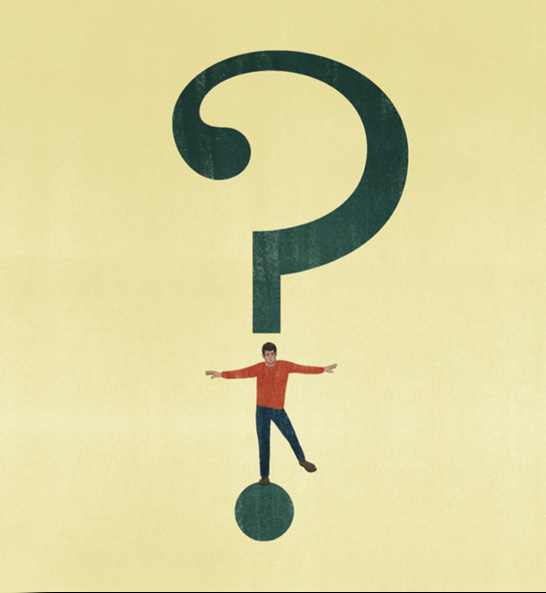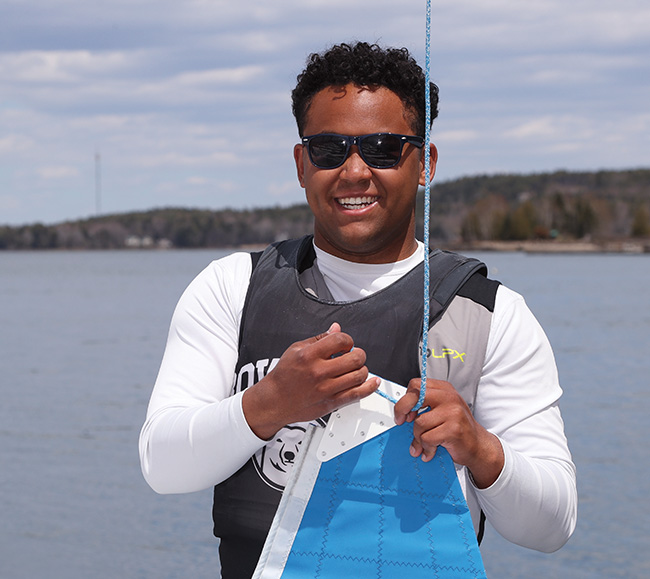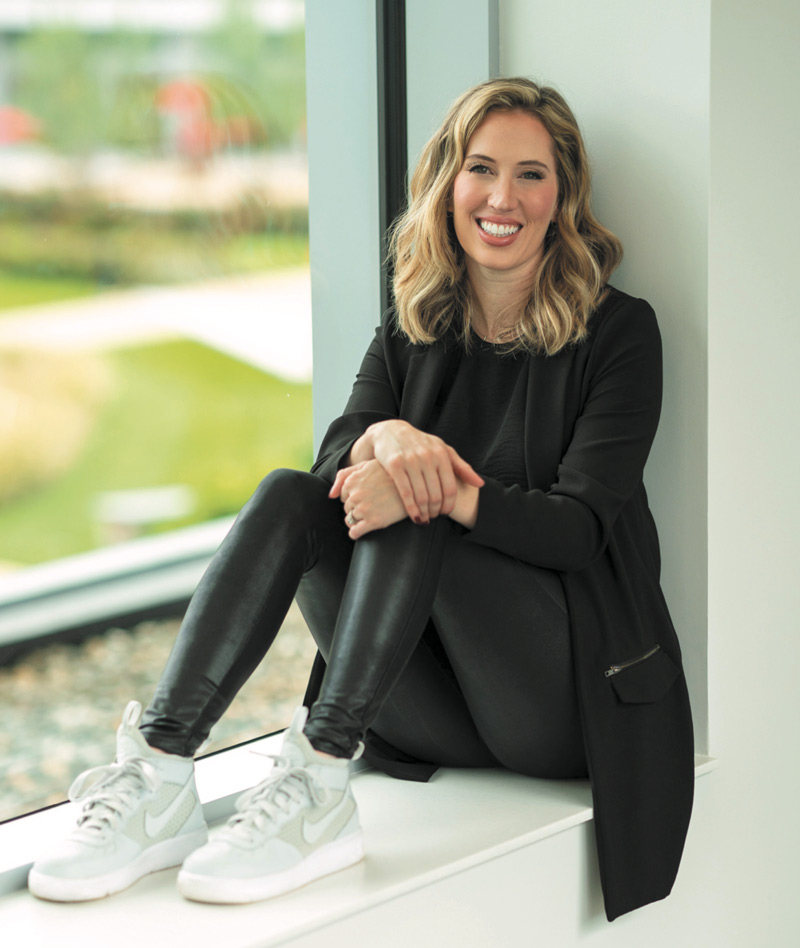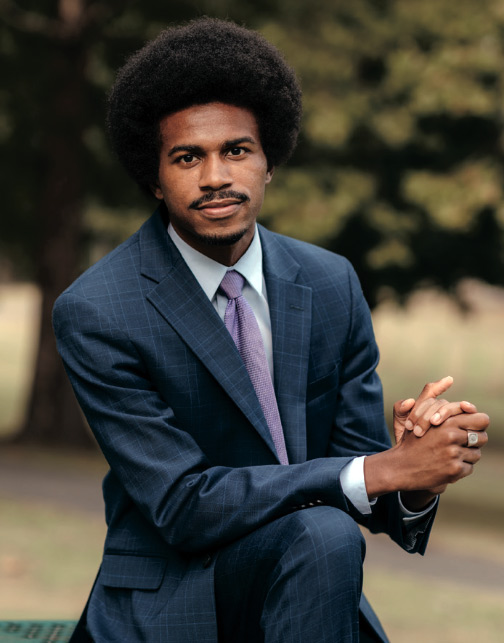Dr. Lee Rowe '50 on the Path to Healing
By Lee Rowe '70Approaching what would have been his 50th Reunion, Lee Rowe ’70 tells of lessons learned over nearly as many years as a doctor. As his colleagues now fight for their patients’ and their own survival, those lessons have never mattered more.
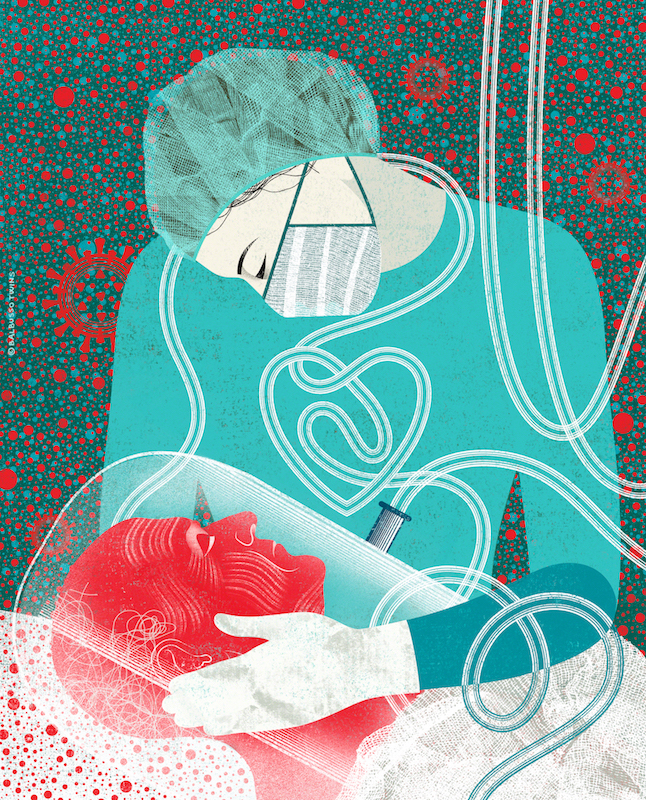
Illustration: Anna & Elena Balbusso
“The future of humanity is held in the hands of those who are willing to learn with empathy for all people.”
I wrote those words to a Bowdoin classmate last year, approaching the end of my clinical career and reflecting on nearly fifty years as a physician. I was considering the tremendous impact by my medical school professors, who nurtured our medical profession as a global force to improve the lives of humanity. They had helped to forge a union of the humanities and sciences, which resonated powerfully with my undergraduate experience at Bowdoin. My professors instilled in me over a half century ago the desire to live life in the pursuit of knowledge and, though sometimes hard, to do so joyously.
For nearly forty years, I served a blue-collar neighborhood in a river district in northeast Philadelphia, Port Richmond. The Polish, Irish, and German immigrants who lived there filled three Catholic churches on Allegheny Avenue for weekly mass and provided labor for factories that are now gone.
Over time, Port Richmond witnessed the protean effects of demographic change, with an accompanying increase in poverty, homelessness, and violence. During those years, I played many roles, among them chief of surgery of Northeastern Hospital—a community institution vital for emergency care as well as many specialties, including my own field of otolaryngology/head and neck surgery.
Life in the neighborhoods, especially for the working poor who do not qualify for Medicaid and who cannot afford private insurance, is especially difficult. Many of the children I cared for were receiving government assistance through CHIP (Children’s Health Insurance Program) and SNAP (Supplemental Nutrition Assistance Program). Our community still had pockets of elderly Eastern Europeans who clung to their traditions, as well as police and firemen who were required to live within the boundaries of the City of Philadelphia. In addition, scattered like millet seeds among the growing barrios were millennials who were gentrifying city blocks.
This was their community, and it became mine. Over the past several years, when morning would come on the avenue, I would pick up trash, discarded needles, and, periodically, human waste. I would rouse rough sleepers off the porches of the three row homes that served as our offices across the street from the hospital. I started to identify with and share their concerns.
As a surgeon, I dealt with facial and neck traumas, obstructed airways, and life-threatening hemorrhages, among other maladies. I learned to compartmentalize my fears and maintain a surface layer of poise and courage. I knew from decades of rushing into emergency and operating rooms in the middle of the night that fatigue was not an option. In order to survive, you must maintain a willingness to not give up, to be imaginative and inventive, to turn the world topsy-turvy if necessary.
My own son, Christopher, was born with cystic fibrosis, a fatal genetic disorder that causes progressive loss of lung and pancreatic function. When he was born, Chris’s life expectancy was about twenty years. I was told by his lung specialist, “Don’t worry. Stay focused on your own field. Leave Chris’s care to us.” Ten years ago, while I was in the operating room performing a surgery, I received a phone call that my son had died. There was no time to cry—I had to finish two more scheduled surgeries.
Chris had recently been hospitalized for yet another lung infection and had been discharged. Two nights later, he died in his sleep. But I knew in my heart it wasn’t his disease that killed him. It was an accidental overdose of opioids that he had been taking for chronic pain, for which all his physicians, myself included, bore responsibility.
The art of medicine is the art of healing. It demands empathy—taking on the burden of another person’s suffering, but not succumbing to it.
Driving back to Philadelphia from Los Angeles in my son’s car with his ashes, I had never felt lonelier or more filled with grief. I had no travel companion, the radio was broken, and I had no words—I was voiceless.
When I started my career, I was afraid to tell my patients that they had cancer. How do you look into someone’s eyes and tell them that the lump in their throat is cancer, and they will need their voice box removed? The fear and isolation in their voices challenged me to be honest, listen to their needs, and guide them through treatment choices. Sometimes, sadly, there are no remaining choices.
The art of medicine is the art of healing. It demands empathy—taking on the burden of another person’s suffering, but not succumbing to it. This is at the heart of our basic principles, whether we are doctors or newly minted Bowdoin graduates.
When I began writing this piece, the pandemic that has now changed our lives was a faraway occurrence, left to the World Health Organization and our federal government to consider.
That has changed in one breath. My colleagues are now fighting a war where they can’t see the enemy. They do not have the protective barriers to keep the invading army out of their patients’ lungs—or their own. Fear and the specter of death crowd hospital hallways. Physicians worry they will have to decide who will receive a ventilator and who will not. They are fatigued and fearful. They send otherwise healthy young people to an intensive care unit who die suddenly twenty-four hours later. This shakes all of us. Our collective hope lives in empathy.
Empathy is the fruit of the well-rounded life fused with our practical understanding of the humanities and the sciences. It is the progeny of our liberal arts education. It requires daily practice.
The most important thing I’ve learned as a physician is to listen. Listen to those who are in pain. They will tell you everything you need to know. Learn patience. If we listen to a person’s story, it can connect to our own life’s narrative. Understand that every one of us needs to let go of something from their past. When we are trying to imagine someone else’s life, we are connected to them. Through the silence of listening, we can give peace to our own hearts and minds.
The pandemic is a worldwide calamity that we need to confront together with equanimity and empathy. Now is the time to listen in a nonjudgmental and uncondescending fashion, and to help people—with courage and hope. Caregivers and their patients who together encounter their fears of death and failure will through their shared empathy become a source of life for others.
When I originally wrote this piece, it included the anticipated joy of reunion, a time to greet old friends and enjoy their fellowship. I never thought that instead of rekindling memories and sharing stories I would be thinking about the value of dying well and with dignity. But here, in the face of a scourge that terrifies people with the most frightening aspect of dying—the fear of dying alone and not being able to say goodbye—I accept that time is infinite. There will always be time for reunion.
Now is the time for us to reflect and take stock of what we learned at Bowdoin—and beyond. Life is both devastatingly tragic and amazingly beautiful. Now is the time for telling those we love how much their lives mean to us. Living in the moment is not a platitude. We are incredibly strong, and the love for our lost ones will never die. Hope will survive, and so will we.
We need to listen and to confront our fears with poise and courage. We need to learn to embrace empathy for all human beings and maintain a zest for a life of inquiry. The art of medicine is learning to balance the competing and complementary messages of the humanities and the sciences. In these and all other challenging times, the art of life sustains us.
Time, whether a half century or a pandemic moment, can be transformational and from it may slowly emerge the voice of wisdom. Our Bowdoin experience began a lifetime of learning, but without empathy, there would have been no wisdom. Without wisdom, we cannot heal others—or ourselves. The future of humanity is the empathy for others that we hold in our hands.
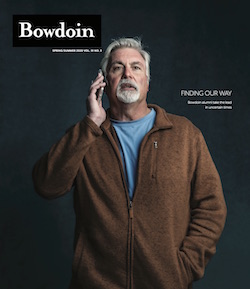
This story first appeared in the Spring/Summer 2020 issue of Bowdoin Magazine. Manage your subscription and see other stories from the magazine on the Bowdoin Magazine website.
